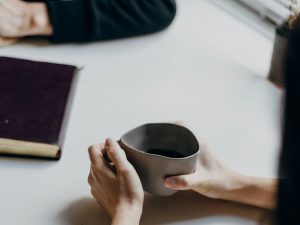And at the same time better relate to others.
Answering the simple question, “Who are you?” is often complicated. Depending on the context of the conversation, you might respond with a fact about yourself, an aspect of your worldview, some adjectives, a series of letters or a single number.
But who are you, really? Without the context.
The question is big, and the answers highly individualized, especially in Western culture.
The journey to knowing ourselves starts “the moment we start to have awareness of self,” said Nadine Hanchar, a Victoria, British Columbia-based counselor and Neuro-Linguistic Programming Trainer.
Early-on in development, we start gaining self-awareness through steps like recognizing our face in the mirror, which happens during the toddler years. As we grow and change, we also grow in our self-awareness. Hanchar has noticed individuals wanting to dive deeper in knowing themselves during the working years of life.
“I think there are more people age 25–65 that are ready to explore self-awareness,” Hanchar said, adding, anyone at any age can benefit from learning more about themselves through avenues like taking a personality test.
Why do we seek to know more about who we are? Experts say we’re wired for wanting a deeper understanding of ourselves, so we can work to become better versions of who we are and better relate to others.
“It’s kind of like our fascination with a mirror,” said Oklahoma City-based Clinical Psychotherapist Kevon Owen. “As people, we want to know how we look to others. [We] want to know if there’s an explanation for why we are the way we are. Strangely enough, we want to be unique individuals, but we want to know we can experience the connection that comes through being understood.”
The road to self-awareness
The journey to knowing yourself isn’t a clear-cut path after hitting the developmental milestones, though there are steps you can take if you want to become more self-aware.
“One proactive step is taking responsibility for self,” Hanchar said. “Another is to ask ourselves better questions— ‘What can I learn from this experience?’ versus ‘Why does this always happen to me?’ or ‘How would I do that differently if it were to happen again?’”
Another step is taking a personality test to put words to your experiences. You’ve probably heard of the better-known personality assessments, like Myers-Briggs, StrengthsFinder and Love Languages, but there are many available.
“Personality evaluations assist people in gaining new perspectives. They assist people in understanding their own behavior, natural talents and their own challenges,” said Hanchar, who developed her own personality profiling system called Progressive Edge Plus Personality Process. “[Personality tests] help people come to accept themselves. They can give them ways to work better with their strengths and how to deal with the challenges.”
Using personality tests for good
Personality tests come on a spectrum, ranging from silly to scientific. If you’ve found out what kind of chocolate bar matches your personality after scrolling Facebook, the results lack the merit of a research-backed evaluation.
“Some people use personality tests like a horoscope, to find out their tendencies and how it will affect them in the future,” said Dr. Sal Raichbach, Director of Clinical Development at Ambrosia Treatment Center in West Palm Beach, Florida. “Because [personality tests] tell you insights about yourself, it can seem like in some ways they can predict the future. A scientifically designed personality test can help you gain self-awareness and improve the way you communicate and interact with others.”
While the results of a more thorough personality test might prove to be insightful, it is dangerous to use them beyond their intended use—as a tool for personal awareness and growth.
“The result of a personality test can provide me with a perfect excuse for why I am the way I am,” said Philadelphia, Pennsylvania-based psychologist Dr. Talya Miron-Shatz, founder of Buddy&Soul. “And even if I’m not perfect, it might be easier than trying to change, or modify, or take some steps toward overcoming whatever parts of my personality that are not serving me well, or are being difficult on my loved ones.”
Better understanding yourself, better understanding others
In “Know Thy Selves: Learning to Understand Oneself Increases the Ability to Understand Others,” a study published in the Journal of Cognitive Enhancement, psychologists found participants who improved the most at identifying different aspects of their personality after taking a “contemplative training course” also improved at inferring the mental state of others.
The study’s finding of the connection between self-awareness and empathy coincides with the fact both self-awareness and empathy are key aspects of emotional intelligence, the ability to understand the way people feel and react and to use the skill in decision making.
“Learning to identify negative aspects of the self was predictive of a better understanding of other people,” the study states. “This insight could prove important in an increasingly complex and interconnected world where taking the view of others, especially those from different cultures or with different religious backgrounds, becomes ever more difficult—and ever more necessary.”
Embarking on the journey to knowing yourself might seem like a trip down an egotistical rabbit hole at first glance, but the way you show up in the world has further-reaching impact. Why not use who you are for good?













Comments are closed.